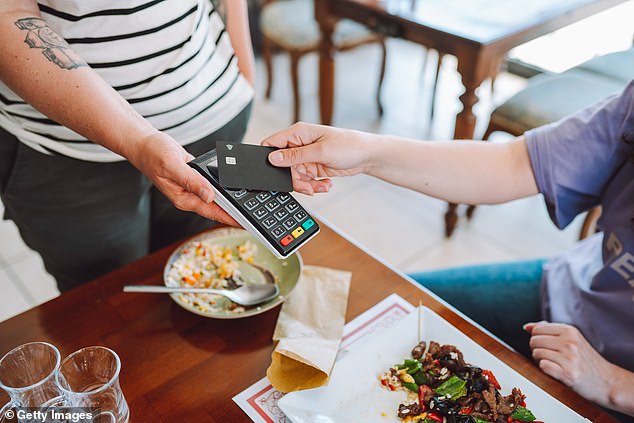Table of Contents
Tourists are returning from abroad with a whopping £429m in unspent cash on their prepaid travel cards, research claims.
The amount remaining on prepaid cards has risen 16 per cent from £369 million last year, according to travel debit card firm Currensea.
These travelers may face additional fees and low exchange rates when withdrawing the remaining cash, while many simply forget about the leftover funds on their card after returning home.
Prepaid cards are chip-and-PIN cards that allow travelers to load cash in a different currency in advance and avoid using their main bank account while on vacation.
Tap and go: Prepaid travel cards are convenient, but they can incur fees for withdrawing any money left on them at the end of the vacation.
They are offered by many companies, including Post Office, Sainsbury’s, Travelex and Mastercard.
On average, travelers return from their trips with £89 left on their prepaid cards, while 27 per cent of those using these cards have more than £100 left to spend, according to Currensea.
A whopping 42 per cent of those with school-aged children return with more than £100, with an average of £109.
James Lynn, co-founder of Currensea, said: “UK travelers are wasting a huge chunk of their holiday savings by sticking with expensive and inconvenient prepaid cards that offer little value, high fees and require the hassle of topping up.”
‘Topping up prepaid cards before traveling leaves no room for error and often leaves tourists scrambling for money at exorbitant ATMs, facing high bank fees when they have to rely on their bank card, or risking returning from vacation with huge amounts of money. leftover money in prepaid cards.’
What are prepaid cards and what are the rates?
Prepaid travel cards work much like a credit or debit card, allowing you to withdraw money from ATMs or spend your money in stores and restaurants.
The key difference is that the card is only loaded with the amount of money you are willing to spend.
This has its benefits, as it allows you to budget more efficiently, as well as locking in one exchange rate when you load the card, rather than a different rate each time you spend.
According to Currensea, around 13 per cent of tourists opt for prepaid cards as their preferred method of spending on their holiday.
However, these cards often charge a fee when the card is loaded, charge cash withdrawal fees, and sometimes even transaction fees.
For example, the Caxton prepaid travel card will charge £1.50 for UK withdrawals, while the Post Office travel card will charge the same.
Both cards also impose a £2 monthly fee for inaction after a 12-month period.
A third of prepaid card users are under the impression that they offer better exchange rates than other payment methods, meaning they could still be losing even if they spend all the money on their card.
In fact, regular debit cards that don’t charge fees for use abroad often offer a better deal.
For example, a Monzo debit card will allow you to purchase €1.1697 for every £1, while the Caxton black card will allow you to purchase just €1.14.
Meanwhile, Currensea’s own offer will allow you to buy €1.1676.
Lynn said: “Millions of people still mistakenly believe that prepaid cards offer the best solution when it comes to spending money abroad.”
‘They are no longer more secure than bank cards as most banks and card providers allow you to simply freeze your card if it is lost or stolen and the rates are not competitive.
“By adopting smarter spending habits, travelers can avoid excessive currency exchange rates, ensuring they get as good a deal on their vacation spending as they do on flights or accommodations.”
Since prepaid cards have their drawbacks, what other options are available?
Cash is still king
Gone are the days when an envelope full of foreign cash was an essential part of planning a trip abroad. However, more than half of travelers still consider it an important part of their spending.
The old saying that ‘cash is king’ is becoming true, with 58 per cent of Brits still preferring physical money while on holiday, according to Currensea.
More than a quarter of people, 27 per cent, said they use their credit card abroad, while 27 per cent also use a commercial bank card.
Spending cash can also help you stick to your budget.
Since many ATMs charge withdrawal fees in foreign countries, withdrawing cash beforehand can be a sensible decision, especially as you can compare the exchange rates offered by various providers.
However, these rates may not be the best, especially if you leave them until you get to the airport to exchange your pound sterling.
Plus, traveling with cash puts you at risk of losing it or having it stolen.
Some links in this article may be affiliate links. If you click on them, we may earn a small commission. That helps us fund This Is Money and keep it free to use. We do not write articles to promote products. We do not allow any commercial relationship to affect our editorial independence.


